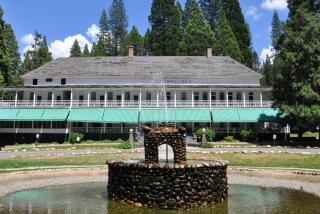Park Service Plans to Reduce Lodgings in Yosemite : Tourism: The agencyâs chief says the sale of the parkâs concessions eventually will mean fewer units for visitors.
The National Park Foundationâs purchase of the tourist operation at Yosemite National Park was engineered with the expectation that about 17% of the lodgings in Yosemite Valley would eventually be removed, according to National Park Service Director James Ridenour.
âThat is why we wanted to negotiate down the price,â the park chief said in an interview.
In talks last week to acquire Yosemiteâs tourist operation, Ridenour and other park officials sought a purchase price low enough to ensure that the next park concessioner could pay it off, earn a profit and still reduce its presence in Yosemite Valley, park officials said.
These objectives, as outlined by Ridenour, provide the clearest indication of the Park Serviceâs intentions of implementing a 1980 management plan that called for reduced development in the park by 1990.
Under Ridenourâs formula, the concessionerâs share of responsibility for relocating housing and removing buildings will not be completed until 2008.
âThis is excellent. This is what weâve been waiting to hear,â said Joan Reiss, regional director of the Wilderness Society, who said the 1990 goal was unrealistic. She said she will remain skeptical until she sees the budget figures and âsome kind of timetable on how this is going to be achieved.â
The failure to enact the management plan has been at the center of a feud between environmentalists and the MCA Inc.-owned tourist concession, the Yosemite Park & Curry Co., owner of most of Yosemiteâs lodgings, restaurants and stores.
Because of lack of money from the Park Service and resistance from Curry Co., the plan never really got off the ground. It recommends relocating some company and park employee housing outside of Yosemite Valley and removing from the valley many structures, including some tent cabins, Yosemite Lodge units and touristsâ âhousekeepingâ quarters--cinder-block units with canvas roofs that give visitors the feel of camping.
Conservationists have complained that the park has become too cluttered and commercial, while the company insists it has been trying to meet demand. Removing 17% of the 1,805 rooms is bound to make it more difficult to get accommodations in the scenic valley, where all but the tent cabins and campsites are already booked for the summer.
Ridenour said park officials had these goals in mind when they recently resumed negotiations with MCA Inc. over the parkâs future. The talks were initiated in the fall when Matsushita Industrial Electric Co., a Japanese firm, indicated its intention to purchase MCA.
They ended in the sale of the Curry Co. for $49.5 million to the National Park Foundation, a nonprofit group created to accept private donations for the Park Service. The purchase takes effect in September, 1993, when MCAâs Park Service contract for the Curry Co. expires.
Under terms of the sale, the foundation will own the company and give its buildings to the Park Service. Bidding will be held to determine who will run the park concession. The purchase will be financed by revenues earned by the next concession.
âWhat we did was try to estimate what our general management plan implementation cost might be and try to build it into our financial projections,â said Stephen Crabtree, chief of concessions in the Western Region of the National Park Service and an adviser to Ridenour during negotiations with MCA.
Crabtree acknowledged that in many cases he had to make some âwildâ estimates about future costs. âIâve woken up in the middle of the night and said, âGoodness gracious, what a lot of money to be responsible for,â â said Crabtree, referring to the $62 million the sale will cost, including interest.
Leonard Silverstein, an attorney for the park foundation, said he expects the foundationâs board of directors to bid for the concession contract in 1993, although it has made no decision.
The foundation is run by a board of directors appointed by the secretary of the Interior, many of them prominent business leaders.
Congress created the Washington-based foundation in 1967 to make it easier for people to donate money to the Park Service. Silverstein said the group has about $9.5 million in assets and received $3.5 million in 1989.
If it goes after the contract, the foundation could be a formidable competitor for the Yosemite Restoration Trust, a nonprofit group founded in part by conservationists to bid for the concession contract.
Patricia Schifferle, an advisory member of the trust, acknowledged the difficulty of competing against another nonprofit group with strong Park Service ties. But she said the trustâs prime concern is enacting the 1980 plan, not winning the concession contract.
Although pleased to learn of Ridenourâs commitment to the plan, Schifferle said she was not confident that the battle had been won.
âI still believe there is going to be a need for vigilance on the part of the public to ensure the Park Service doesnât backslide,â Schifferle said.
More to Read
Sign up for The Wild
Weâll help you find the best places to hike, bike and run, as well as the perfect silent spots for meditation and yoga.
You may occasionally receive promotional content from the Los Angeles Times.







